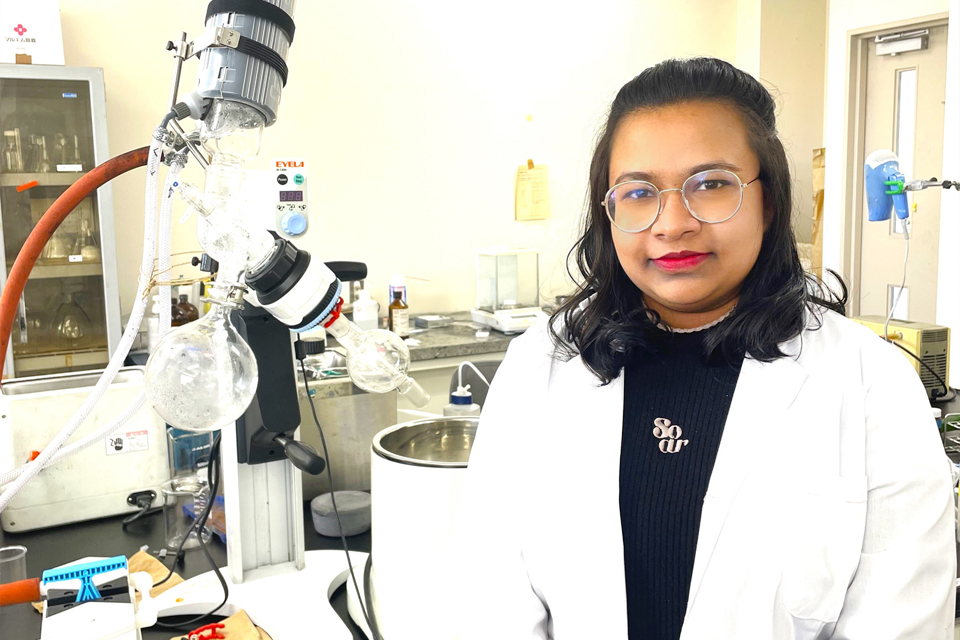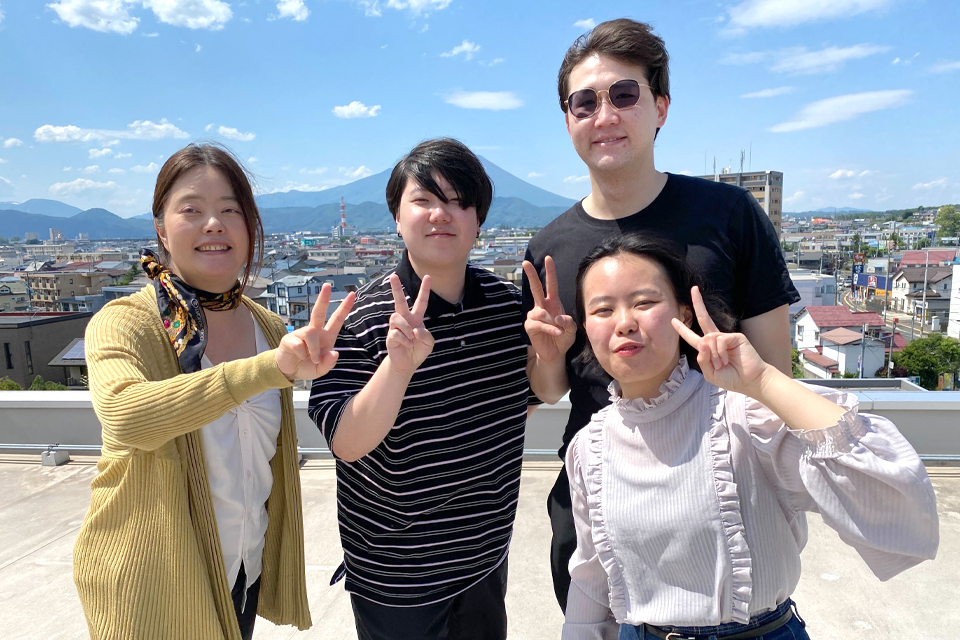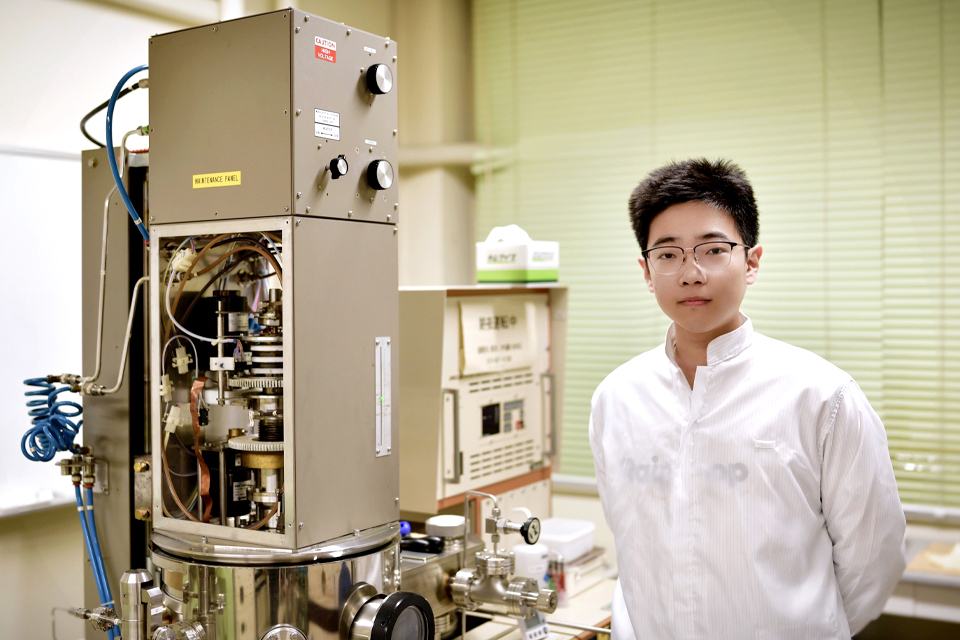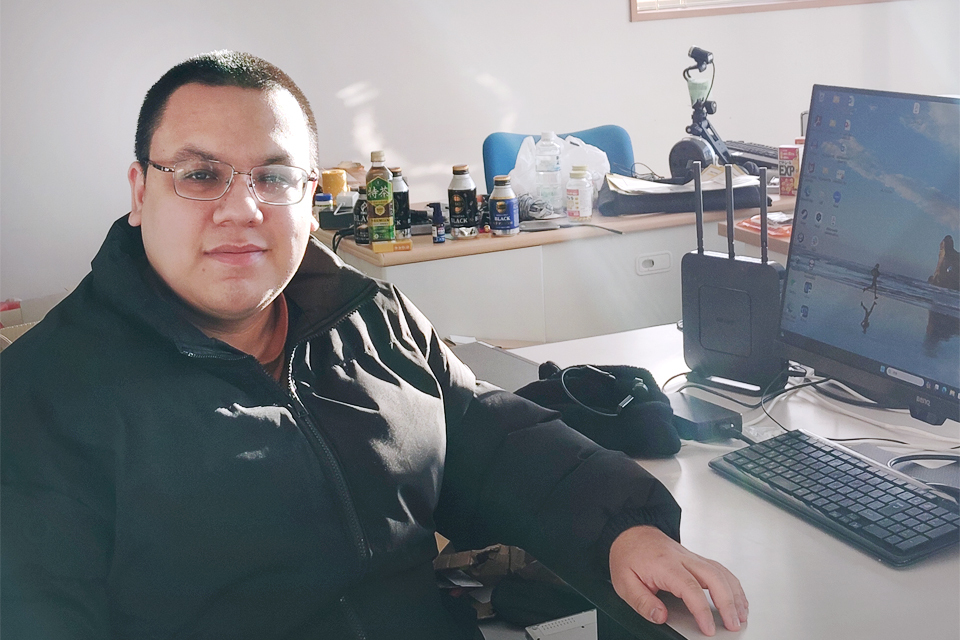


Graduate School of Arts and Sciences
Graduate Course in Chemistry
from Bangladesh
Graduating School: Iwate University Research Student
[Completed in 2023]
I was interested in pursuing my higher study in a foreign country, so I searched the Internet and learned about Professor Takeguchi’s laboratory at Iwate University. I decided to enroll in Iwate University’s graduate school because my research interest was similar to what was being done in this laboratory.
Japan is one of the top countries in the field of science and technology research. In Japan, researchers have a unique independent research environment. And the career opportunities are enormous. In addition, the fact that Japan is considered one of the safest countries in the world helped me decide to choose Japan as a place to further my education.
I love the culture of Iwate, especially the folk dance festival, skiing, and snowboarding. And the local cuisine is delicious. I was also amazed by the beauty of the landscape, which is surrounded by mountains with Mount Iwate. The locals are also hospitable and make life more comfortable. The environment in Iwate always reminds me of my hometown where I grew up.
My research is polymer electrolyte membrane fuel cells (PEMFCs) as an electrochemical device that can convert chemical energy into electrical energy. Presently, Pt-based oxygen reduction reaction(ORR) catalysts are used for PEMFCs, but there are issues such as their large overpotential for ORR, limited resources, and instability during operation, especially under cathodic conditions. Further improvements, particularly in cathodes, are strongly needed. Our research focuses on oxide-based compounds in order to make PEFCs widely practical.
The focus of my research is to create experimental catalysts by combining various types of metals and Pt and to investigate their characteristics. I enjoy analyzing the results of conducting experiments. I feel a sense of fulfillment when the experimental results are the same as my expectations. Sometimes I have a hard time making the catalysts, but with the help of my professor and fellow lab members, I manage to solve the problem.
Global warming is an alarming problem for the world. What we are talking about is reducing pollution and creating an environmentally friendly world. Fuel cells are a technology that can produce large amounts of energy with less pollution. This technology can be used in power plants to produce electrical energy with less smog. The fuel cells can be an energy source for the next generation of energy technology. In addition, by using the fuel cells in various areas of society, we can realize a world with less pollution.
Iwate University is well-equipped with excellent experimental facilities and provides a cutting-edge experimental environment that promotes smooth research activities. In addition, the professors and staff at Iwate University are very friendly and helpful with any questions or concerns.

Graduate School of Arts and Sciences
Graduate Course in Biological Sciences
from Mongolia
Graduating School: Iwate University
[Completed in 2023]
I have been a student at Iwate University since undergraduate school and decided to enter graduate school because I wanted to continue my research in the intracellular transport laboratory where I was enrolled.
I decided to study in Japan because I thought there were many things to learn, including academics, in a country where one can live safely and where food, clothing, shelter, and social systems are well maintained. Iwate University’s entrance examination system allowed foreigners to take the entrance examination while still in their own country, so there was no need to travel to Japan to take the exam, and in addition, there was a laboratory where I could study regenerative medicine, which was of great interest to me at the time.
I have the impression that there are many kind people in the area, including local residents and students. There are all kinds of stores near the university, so there are no obstacles in my daily life. Although it is in the countryside, I think it is a comfortable environment compared to the noisy city environment. Before I came to Japan, I had the impression that there would be a lot of snow, but in reality it was not that much and I did not feel much harm caused by the snow.
I am conducting research using magnetic nanoparticles in the Intracellular Transport Laboratory. Cells contain various organelles (intracellular organelles), which carry out complex material transport in a microscopic environment. Currently, it is known that the tension of the cell membrane, which separates the inside and outside of the cell, is an important parameter for biological activities. However, nothing is physically known about the membrane structure of organelles. Therefore, we are working to elucidate the mechanical organelle membrane mechanism using nanoscale magnetic nanoparticles. This research is conducted in collaboration with the Kobayashi Laboratory in the Materials Course and the Shibasaki Laboratory in the Chemistry Course of the Faculty of Science and Engineering of the same university, and we are able to actively exchange opinions with students and professors from different fields, which is very fulfilling for us because we can learn a lot from the perspective of fusion of different fields.
I feel pleasure when I obtain good data in collaboration with other laboratories. On the other hand, I find it difficult when the hypothesis does not work as hypothesized or when the data cannot be reproduced. However, I believe that the sense of accomplishment you get when you are able to produce results through trial and error is something you can only get if you try.
I hope to make use of this research in the medical field, as it is expected to expand new knowledge in DDS (drug delivery systems) and cell biology, and has the potential to fundamentally change drug treatment, for example, by eliminating side effects.
I have made many acquaintances because I have actively interacted with Japanese people instead of staying with my hometown. When I am talking about my personal life and interacting with friends and teachers, I can look back on my failures and successes and laugh about them, and I feel happy at that moment.

Graduate School of Arts and Sciences
Graduate Course in Electrical, Electronic, and Communication Engineering
from China
Graduating School: North University of China
[Completed in 2022]
I first became aware of Iwate University when I was an exchange student at Tsinghua University. Through communication with a professor at the university, I learned about Iwate University’s graduate school.
The deciding factors were Iwate University’s excellent science and engineering program and outstanding research environment. Iwate’s focus on interdisciplinary and advanced research, its abundant resources, and its professional support further fueled my passion for research. In addition, a professor at the university encouraged me to study in Japan. My professor’s senior is now a professor at a Japanese university.
I was very impressed by the warmth and generosity of the people of Iwate and the acceptance of the local community. By participating in local traditions, festivals, and other cultural events, I was able to deepen my understanding of unique Japanese values and customs. In addition, Iwate’s natural environment is breathtakingly beautiful, and the scenery of each of the four seasons provides new inspiration for my research and daily life.
My research is on ultra-fine thin-film magneto-impedance elements. By fabricating highly sensitive magneto-impedance elements, we can apply them to non-destructive testing and other applications.
The research I am working on now is a little different from my graduation research at university, so it was a little difficult at first. However, under the guidance of my professor, I have been able to adapt to research life, and I feel a special sense of accomplishment every time I put together my research data one by one.
The research conducted is generally applicable to nondestructive testing. I would like to make use of nondestructive testing of metal beams such as bridges and quarries in such fields, as it will enable us to detect safety hazards in advance and ensure the safety of production and life.
The moment when I share my research results and discuss them with other researchers at a conference presentation is very moving, and I feel that my research has the potential to contribute to society at large. It is also stimulating to talk with my supervisor and learn new perspectives and approaches.

Graduate School of Arts and Sciences
Graduate Course in Computer Science and Intelligent Systems
from China
Graduating School: Xi’an University of Technology
[Completed in March 2020]
I know someone who graduated from Iwate University and is working in Japan, and he told me that Iwate University is a really good school. That’s when I set my sights on Iwate University.
Japan is a leader in innovative science and technology, and I decided on Iwate University after hearing about its reputation for providing outstanding education in such fields. I felt that Iwate University with its its excellent academic programs and research facilities offered great opportunities to enhance my knowledge and skills in the field I wanted to study.
The people of Iwate are very friendly, and life here is quiet, which is a plus for me. It’s an agreeable place to live, with plenty of nature and little stress.
My current research theme concerns the development of a system for evaluating the gait of cattle based on the skeleton. The system generates a program to evaluate the skeletal trajectories of cattle before and after hoof trimming. More specifically, it extracts skeletal movements from videos of cows walking and uses machine learning to automatically determine whether a cow’s hooves have been trimmed.
My research subject is extremely challenging, but I find exploring new approaches and solving problems a lot of fun and very rewarding. My research involves handling complex data and surmounting various technical hurdles. Those include accurately extracting skeletal movements from videos of cows and training the machine learning model properly. However, I find solving such problems very rewarding, and I feel I’m growing in the process.
I hope that it will be of benefit to livestock management in the future. I think the system that I am developing for evaluating cow gait will be a useful tool for improving cow health and productivity, which will in turn will help improve food safety and quality.
Yes, I felt that way when I first came to Iwate. At the time, I still didn’t know my way around the campus and its surroundings. There was so much I had to learn, but the school provided each of us international students with a mentor and was always ready to help, both with academic and everyday life. I was much impressed by their kindness.

Graduate School of Arts and Sciences
Graduate Course in Design and Media Technology
from Thailand
Graduating School: Silpakorn University
[Completed in 2022]
After graduating from the Faculty of Design at the University of the Arts in Thailand, I became acquainted with Iwate University through a connection. I attended the seminar and was impressed by the potential of Iwate University.
After attending an educational seminar in Thailand, I became interested in the possibilities and reputation of Iwate University. What I learned about the university during the seminar was particularly impressive and made me want to continue my studies here. I am grateful to my advisor, Professor Takamitsu Tanaka, for believing in me, giving me the opportunity, and supporting my pursuit of a master’s degree at Iwate University.
I am truly impressed with all that Iwate Prefecture has to offer. The peace, the food is amazing, the people are friendly, and the environment is beautiful. I will definitely seize the opportunity to come back here after graduation.
My current research focuses on developing multifunctional products that meet consumer needs while addressing environmental issues. Taking cues from successful brands, I assess product feasibility and quality before scaling up production. The goal is to solve the challenge of creating attractive products while promoting environmental sustainability. This research will investigate whether multifunctional designs meet consumer preferences and provide insight into product performance and usability. Ultimately, we aim to make recommendations to improve product alignment with consumer preferences and sustainable practices.
I am currently focused on the product design prototyping process. This is the most fun and passionate part of the process, where I can utilize my creative thinking, use my imagination, and exercise my creativity.
In the future, we hope to use this research to benefit society by proposing products that better align consumer preferences with sustainability practices. Ultimately, we aim for this research to have a positive impact by providing innovative solutions that benefit both consumers and the environment.
I am always glad and very happy to spend time at Iwate University. I would like to stay here longer and spend more time here. I am grateful and happy to study here.